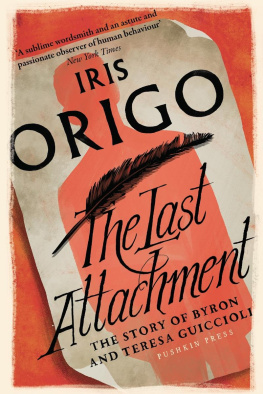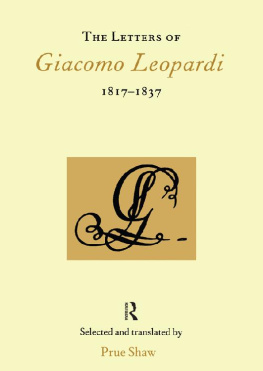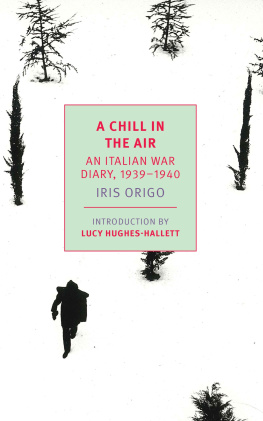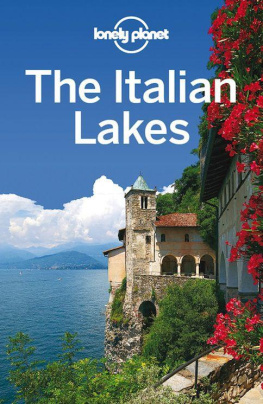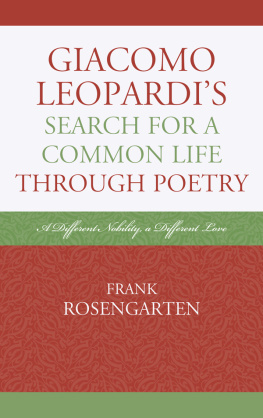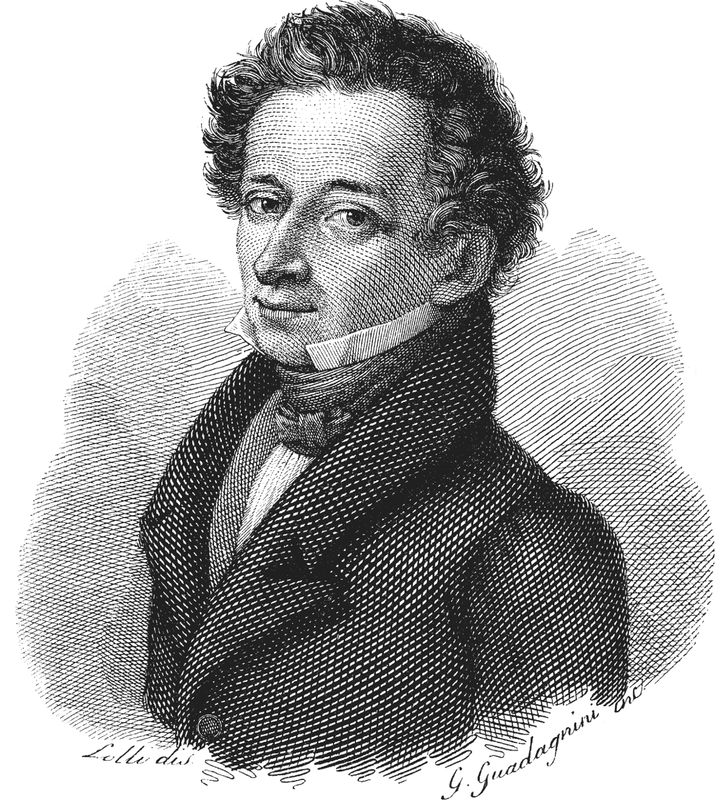T he first edition of this Life of Leopardi, which I have now revised and enlarged, appeared eighteen years ago. Since then the centenary of Leopardis death has been celebrated, with much pomp and many speeches, in both Naples and Recanati, and on the 22nd of February 1939, the little that is left of his bones was transferred from the church of S. Vitale to the slopes of the hill above Mergellina, beside Virgils tomb.
A considerable amount of new materialincluding four more volumes of Leopardis Epistolario and many of the papers left in Ranieris possessionhas either come to light, or has been rendered available. It is listed in the Bibliography at the end of this book. Moreover, two excellent Italian Lives of the poetby Giovanni Ferretti and by Michele Saponaroas well as several interesting critical studies and monographs, have appeared, and two new critical editions of Leopardis Works have been made by Francesco Flora and by Giuseppe De Robertis.
All this recent material, while it has made me aware of the deficiencies of my first effort, does not, I think, lead to any essentially different conclusions about Leopardi, either as a writer or as a man. My apology for this edition is rather the one I would give if I were asked after eighteen years to describe an old friend: in the interval I have perhaps got to know him a little better.
It is sometimes a good plan, however, to go back to ones starting-point; and while I was re-reading Leopardis works, I thought I would also visit his birthplace again. I arrived there on a grey November evening. In the little square before Palazzo Leopardi a piercing wind was raising little eddies of dust and dead leaves, and an old womanthe only human figure in sightwas hobbling up the church steps, with a little straw chair under her arm, her black shawl drawn tightly around her. I followed. In the centre of the nave, beyond the font where Leopardi was baptized, a bier, draped in black velvet, with a great waxen candle at each corner, was prepared for a funeral. The long wooden bench where I knelt still bore the inscription, gentis Leopardae. I came out and wandered up the long, winding street. The shutters of the palazzi were closed; an unusually high proportion of the people I met seemed to be either crippled or infirm; and another blast of biting wind came with renewed vigour up one of the narrow side streets, at the corner where Leopardis hat was blown off, and the little boys jeered, as he wrapped his cape over his head.
I rang the bell of Palazzo Leopardi and was shown into the library; its chillthough it was only Novemberentered my bones. On the table, in a case, I saw the brown rugs which the poet used to wrap round his shoulders and knees: they seemed thin. Beside his inkstand the petals of the carnation left there by Carducci had shrunk to a pinch of dust. But everything else in the library was unchanged. Still a metal grating enclosed the books forbidden by the Church and among them Leopardis own Operette Morali; still the traveller may see the beautiful copperplate hand in which, at ten years old, the poet wrote out his dissertations and his translations of Horace; still he may handle Leopardis Virgil, his Tasso, and his great lexicons; and still, across the little square, he may see the window where Leopardi watched Silvia at her loom.
But here, unfortunately, there is a change. For the citizens of Recanatiwith belated and perhaps excessive pietyhave celebrated the centenary of the poets death by putting up, on every site mentioned in his poems, a number of white marble tablets, inscribed with some of his lines, and on Silvias little house we may read all too plainly the verse about
la man veloce
Che percorrea la faticosa tela.
The whole town is bestrewn with these tablets, white and incongruous on the faded brick walls. They may be seen on the doorway of Palazzo Leopardi, on the torre del borgo, on the tower of il passero solitario, on what was once a lonely country path, leading to the hill of LInfinitoand, worst of all, on the wall encircling the hill itself, which has now been turned into a trim public garden.
But perhaps, after all, it is not very important. For as I stood on the hill in the fading light, the wind dropped; a pale autumnal gleam caught the far snow-capped peak of the Gran Sasso and lingered upon the long trellises of yellow vine-leaves in the fields below, and on the orange flames of the bare willows. Le vie dorate e gli ortithere they lay. And suddenly it seemed very easy to understand the mixture of love and aversion that Leopardi had felt for his native city. Bitterly as he railed against it, he never ceased to belong there and to feel the tie that tugged him back. He belonged to Recanati as Flaubert did to Rouen, as Joyce to Dublin. This was the town that in his youth he called horrible, detestable, execrated, a prison, a den, a cave, an inferno, a sepulchre in which the dead are happier than the living, and the deadest and most ignorant city of the Marches, which is the most ignorant and uncultivated province of Italy; this the city of whose 7,000 inhabitants he said that they were only remarkable for their endurance in remaining there, while he himself vowed never to return there permanently until I am dead. And yet, and yethardly had he got to Rome than he wrote to his brother that life in a big city was only bearable if a man could build himself a little city within the great one. Hardly had he got to Bologna than he was walking upon the hills, seeking for nothing but memories of Recanati. When he returned there from Rome, it had become la mia povera patria; when he published his Canti in Florence, he put the name of his birthplace upon the title-page; and when, in the following year, he felt his strength decreasing, he wrote to a friend that if he got any worse he would return to Recanati, since I wish to die at home. And certainly many of his greatest poems were either written there or directly inspired by his memories of youth and of home, of the night wind stirring in his fathers garden, and the stars shining above his native hills.
There is, moreover, I think, a more fundamental sense in which Leopardi belongs to Recanati. Many men of genius, perhaps most, have been, in the botanical sense, sports (Shelley is the first instance that comes to mind). But Giacomo Leopardi was a very direct product of his inheritance and environment: he was a very great poet, but he also always remained a provincial aristocrat, the son of Conte Monaldo and Contessa Adelaide. From his stock he derived his fastidiousness, his pride, and his ill-healththe heritage of the fin de race. From his mother, his melancholy, his sense of grievance, his reserveand, perhaps, some of his sensibility. From his father, his gentle manners, his love of books, more of his mental attitude than he would have liked to admitand not his genius, but his talent.
There are two Leopardis: the poet and the man. The man, as he revealed himself in many of his letters and his diaries, was a querulous, tortured invalid, mistrustful of his fellow-men, with a mind sometimes scornful and cantankerous, and a heart intolerably sad and lonely. But to this unhappy man was granted the poets gift: a capacity for feeling so intense and an imagination so sensitive and lively that he could perceive, in the most common sights of daily life, the heavenly originals of which, according to Plato, all earthly objects are but copies. To a sensitive and imaginative man, he wrote, who lives, as I have lived for a long time, constantly feeling and imagining, the world and its objects are, in a way, double. He sees with his eyes a tower, a landscape; he hears with his ears the sound of a bell; and at the same time his imagination sees another tower, another bell, and hears another sound. And it is of these sights and sounds that poetry is made.


